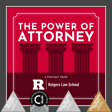
S3E11: Cryptoassets and Regulation, with Professor of Law Yuliya Guseva
Professor Yuliya Guseva, Head of the Blockchain and Fintech Program, which is part of the Rutgers Center for Corporate Law and Governance, joins Interim Co-Dean Rose Cuison-Villazor to discuss her work and research in cryptoasset regulation.
Join the CCLG for its Symposium on Regulation of Cryptoassets, Wednesday, February 16, 2022. You can register at go.rutgers.edu/crypto2022.
The Power of Attorney is produced by Rutgers Law School. With two locations minutes from Philadelphia and New York City, Rutgers Law offers the prestige and reputation of a large, nationally-known university combined with a personal, small campus experience. Learn more by visiting law.rutgers.edu.
Production Manager: Margaret McCarthy
Series Producer: Nate Nakao
Editor: Nate Nakao
--- Send in a voice message: https://podcasters.spotify.com/pod/show/rutgerslaw/message

